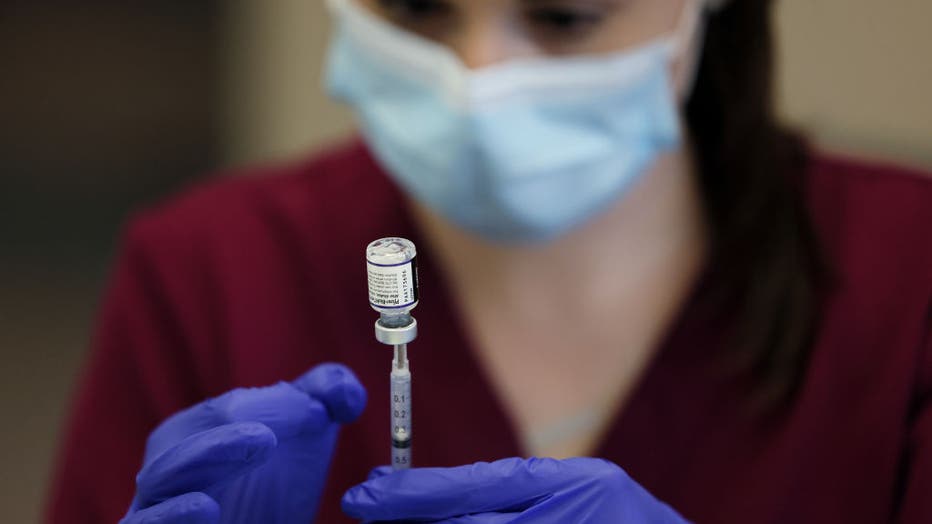COVID-19 boosters: CDC director OKs shots for all adults after FDA approval
WASHINGTON - The U.S. on Friday opened COVID-19 booster shots to all adults and took the extra step of urging people 50 and older to seek one, aiming to ward off a winter surge as coronavirus cases rise even before millions of Americans travel for the holidays.
Until now, Americans faced a confusing list of who was eligible for a booster that varied by age, their health and which kind of vaccine they got first. The Food and Drug Administration authorized changes to Pfizer and Moderna boosters that makes it easier.
Under the new rules, anyone 18 or older can choose either a Pfizer or Moderna booster six months after their last dose. For anyone who got the single-dose Johnson & Johnson vaccine, the wait already was just two months. And people can mix-and-match boosters from any company.
The latest action expands the government’s campaign to shore up protection and get ahead of rising coronavirus cases that may worsen with the holidays.
Pfizer and Moderna announced the FDA’s decision after at least 10 states already had started offering boosters to all adults. The latest action simplifies what until now has been a confusing list of who’s eligible by allowing anyone 18 or older to choose either company’s booster six months after their last dose — regardless of which vaccine they had first.
Pfizer submitted its application to the U.S. Food and Drug Administration last week, and Moderna on Wednesday announced that it had filed an emergency use authorization request.
Final sign-off from the CDC greatly expands who is eligible. Boosters are now recommended for people who initially received their second Pfizer or Moderna shots at least six months ago if they’re 65 or older or are at high risk of COVID-19 because of health problems, their job or living conditions. Boosters are also recommended for people who received the single-dose Johnson & Johnson vaccine at least two months ago.
Anyone eligible for a booster doesn’t have to stick with their initial vaccination type and can get a different company’s vaccine, what’s called mixing and matching, according to the CDC.
RELATED: COVID-19 vaccines: CDC OKs Moderna, J&J and mix-and-match boosters
Nearly 31 million Americans have already received a dose beyond their original vaccination, including those with weakened immune systems, such as cancer patients and organ transplant recipients who need an extra dose to be fully vaccinated.
While all three vaccines used in the U.S. continue to offer strong protection against severe COVID-19 illness and death, the shots’ effectiveness against milder infection can wane over time.

FILE - A registered nurse draws up a dose of the Pfizer COVID-19 booster at Park Avenue Health Center in Arlington, MA on Nov. 9, 2021. (Photo by Jessica Rinaldi/The Boston Globe via Getty Images)
Pfizer submitted early results of a booster study in 10,000 people to make its case that it’s time to further expand the booster campaign. The study found that a booster could restore protection against symptomatic infection to about 95%, even as the extra-contagious delta variant was surging. Side effects were similar to those seen with the company’s first two shots.
Moderna is asking for a lower-dose booster because it triggered fewer uncomfortable shot reactions such as fever and achiness, but also because it leaves more vaccine available for the global supply. The company has said immunity from its vaccine does wane over time.
As the delta variant surged in July and August, a Moderna study found people who were more recently vaccinated had a 36% lower rate of "breakthrough" infections compared with those vaccinated longer ago.
Another study of 344 people found a six-month booster shot restored virus-fighting antibodies to levels thought to be protective — and that included large jumps in antibodies able to target the delta variant. But that was a small study, and only about half of those people got the exact series of doses that would be offered under a Moderna booster campaign.
RELATED: Multiple states open COVID-19 booster shots to all adults
RELATED: Pfizer asks FDA to authorize COVID-19 booster shot for all adults over age of 18
Dr. Anthony Fauci, the country’s top infectious disease expert, said earlier this week that he believes COVID-19 vaccine boosters will be needed to avoid a possible "double whammy" of the highly transmissible coronavirus delta variant and waning immunity this winter.
"The somewhat unnerving aspect of it is that if you keep the level of dynamics of the virus in the community at a high level — obviously the people who are most, most vulnerable are the unvaccinated — but when you have a virus as transmissible as delta, in the context of waning immunity, that dynamic is going to negatively impact even the vaccinated people. So it's a double whammy," Fauci said in a pretaped interview aired at the 2021 STAT Summit Tuesday.
"You're going to see breakthrough infections, even more so than we see now among the vaccinated," he added. Fauci even suggested that a third COVID-19 vaccine shot may no longer be a "luxury," but part of the required vaccination process.
"I happen to believe... that a third shot boost for an mRNA is likely, should be part of the actual standard regimen," he said.
RELATED: Fauci says COVID-19 vaccine boosters will help avoid winter ‘double whammy’
Catherine Stoddard and the Associated Press contributed to this report. This story was reported from Cincinnati.


